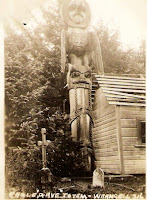Tlingit Language Revitalization in Southeast Alaska
Click to hear my Tlingit introduction in a WMA audio file.
The following is the foreword to my new poetry book The Hide of My Tongue to be published by Plain View Press in the winter of 2010.
The following is the foreword to my new poetry book The Hide of My Tongue to be published by Plain View Press in the winter of 2010.
Originally published as an interview with Tlingit language instructor Vivian Mork, Yeilk' (Little Raven) titled: "Perspectives from a Tlingit Language Instructor" and appeared in Sharing Our Pathways.
Tsu héidi shugaxtootáan yá yaakoosgé dakeit haa jeex' a nák has kawdik'éet'.— Kichnáalx .We will open again this container of wisdom left in our care.—George Davis
***
Perspectives From a Tlingit Language Instructor
The pride in learning your Native language is a big change from past generations. We’ve come a long way from the boarding-school generation who were forbidden to speak their languages. When you look through old government documents, you find references that the government knew in order to get rid of the “Nativeness” in Native people, they had to remove children from their homes, out of the culture, out of the influences, and take away their customs and their language. Because language and culture are intertwined, the government schools had to take it away to assimilate them—it was almost successful.
But it wasn’t just the boarding-school experiences that created the loss of our language: it began with epidemics such as small pox and tuberculosis. These diseases wiped out entire villages including their traditional knowledge and language.
Also, there were entire generations of people who decided that the language was dead and let it go. This came after the push to assimilate Natives into mainstream American society. There were reasons why people went to the schools and reasons why people sent their family members away to get educated. Native people knew change was coming. They needed to be ready and one way was to educate leaders within the Western system. But it didn’t have to be done in such a traumatic way.
Although the process of re-learning the language is difficult, through learning, both young and older students have been changed. There are people who've decided to dedicate their lives to learning the Lingít language and have devoted themselves to making sure it will never die. It's changed how we language-learners relate with one another; knowing we are going to interact with each other for the rest of our lives, we treat each other with respect.
Despite the lack of natural settings, teaching in the school system is important. When children start to learn the language, they realize where their pride can come from. We tell them that they’ve been here since time immemorial and this land is theirs—they belong to it. When they really know who they are in the language, no one can take that away from them. This is amazing to hold on to; it makes their spirits stronger. After all, the Lingít language is such an elaborate language—It needs to be lived—It's a living language.



Comments
I'm curious to know how long it took you to learn the language [and how much/how often you worked at it during that time frame]?
I've been learning the language for over ten years now and I still can only 'baby-talk.' At first, I spent many hours (12 plus?) a week studying by myself and with a local teacher in the village of Hoonah, Alaska and in her classroom at school. We also started a Tlingit language family night and played games in Tlingit. Then I took lessons via the University of Alaska Southeast. I've also attended two language immersion camps. Since Tlingit is one of the most complex languages in the world, I will be a lifelong learner. It helps to be able to talk to my daughters in the language.
especially loved this:
" . . . this land is theirs—they belong to it. When they really know who they are in the language, no one can take that away from them. This is amazing to hold on to; it makes their spirits stronger."
Oddly enough, language/culture assimilation is also happening within the Chinese communities. I'm in Hong Kong where Cantonese is considered a somewhat 'inferior' dialect though it's so full of life - because it's not official written Chinese, which, in recent times in Chinese culture, is Mandarin. At some schools students are taught to read classical literature in Mandarin though those poems/essays were written in Cantonese back in those days.
In Guangzhou (closer to Hong Kong) where people have always spoken Cantonese, the authority is forcing TV stations to switch to Mandarin so there'd be 'cultural consistency' during Asian Olympic Games (it takes place in GZ) for the world to see. Even historical monuments that carry Cantonese inscriptions were removed. It sparked off large-scale protests that rallied the support of many Hong Kong people and even expatriates, while protests are actually strictly forbidden in China.
I'm hosting the Dec edition of Lang/Place and I hope you'll send something again!